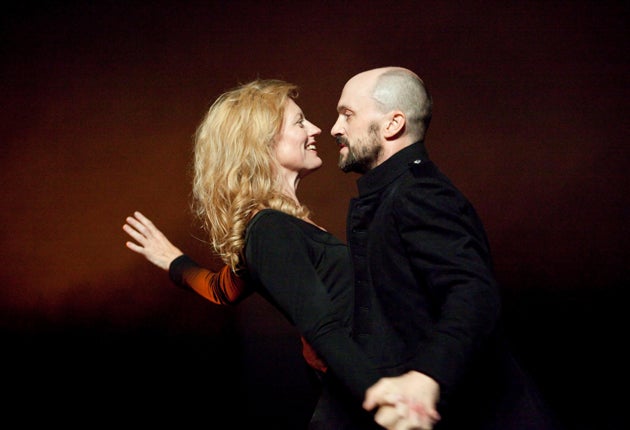Macbeth, Barbican Centre, London

Your support helps us to tell the story
From reproductive rights to climate change to Big Tech, The Independent is on the ground when the story is developing. Whether it's investigating the financials of Elon Musk's pro-Trump PAC or producing our latest documentary, 'The A Word', which shines a light on the American women fighting for reproductive rights, we know how important it is to parse out the facts from the messaging.
At such a critical moment in US history, we need reporters on the ground. Your donation allows us to keep sending journalists to speak to both sides of the story.
The Independent is trusted by Americans across the entire political spectrum. And unlike many other quality news outlets, we choose not to lock Americans out of our reporting and analysis with paywalls. We believe quality journalism should be available to everyone, paid for by those who can afford it.
Your support makes all the difference.There are no visible knives, gore, cauldrons or fateful letters. The witches are reduced to female voices that emerge from the silhouettes of the 12-strong company. Yet by the power of paradox and strong theatrical suggestion, Declan Donnellan's superb Cheek by Jowl version of Macbeth has a terrible and transfixing presence.
Like a cross between psychodrama and fierce, fluid modern dance, the production creates a creepily variable sense of time. There are transitions that move with the speed of a slasher's knife; episodes that seem to emerge from the foregoing scenes as though they had been eerily embedded within them like spies; and soliloquies that impart a sickened sensation of temporal suspension. The actors, in uniform black T-shirts, hurtle across Nick Ormerod's spacious, austerely bare set or freeze-frame expressively under the sculptural, noir-like lighting of Judith Greenwood.
For Donnellan, the witches are evidently an emanation of pre-existing guilty desire – visible to Banquo, too, because we all share the same susceptibilities, though some may choose not to act on them. The production's emphasis is less on the victims of the Macbeths' evil than on the horror of being the Macbeths. For some, this will seem a whitewash of the Stalin-like behaviour of the hero once he becomes king. But Donnellan has listened to the poetry and presents the waking nightmare of the couple's lives after the initial murder and the unravelling of their marriage with a harrowing pathos. Wiry and highly strung, Anastasia Hille's brilliant Lady Macbeth is a woman who, from the start, has to override psychological fragility with a hideously strained firmness of purpose. With his compact physique and humane demeanour, Will Keen's excellent Macbeth shows you a troubled introvert who, in order to survive has to retreat into dreadful self-dissociation.
The physicality of the staging is always in the service of psychological penetration. There's a wonderful moment when Lady Macbeth welcomes the (here blind) King Duncan and their outstretched arms form a kind of threshold under which the soliloquising Macbeth ducks as if gaining entry to the next phase of his plot quite literally through a gesture of sheer sacrilegious fraudulence by his wife.
Highly recommended.
To 10 April (0845 120 7550).
Join our commenting forum
Join thought-provoking conversations, follow other Independent readers and see their replies
Comments